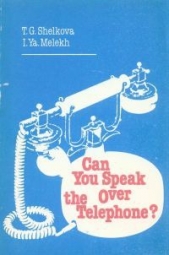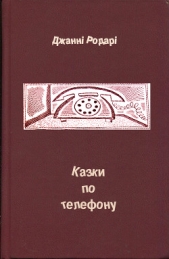Как вести беседу по телефону

Как вести беседу по телефону читать книгу онлайн
Внимание! Книга может содержать контент только для совершеннолетних. Для несовершеннолетних чтение данного контента СТРОГО ЗАПРЕЩЕНО! Если в книге присутствует наличие пропаганды ЛГБТ и другого, запрещенного контента - просьба написать на почту [email protected] для удаления материала
Mr Hopkins: No, thank you. Don’t bother. I’ll get there on my own.
Mr Zotov: Then I’ll be waiting for you at 7.15 outside the theatre. Goodbye.
Mr Hopkins: Thanks a lot. Good-bye.
Mr Smirnov: Hello.
Mr Barlow: Hello. I’d like to speak to Mr Smirnov.
Mr Smirnov: Speaking.
Mr Barlow: Barlow here. Good morning, Mr Smirnov.
Mr Smirnov: Could you speak up, please. Your voice is ever so faint.
Mr Barlow: Hold on a minute, please. I’ll try to fix the microphone. Are you there, Mr Smirnov?
Mr Smirnov: Oh, yes. I think that’s better now.
Mr Barlow: Mr Smirnov, I’m calling to invite you to dinner tomorrow.
Mr Smirnov: Thanks a lot. It’s very kind of you and I’d be happy to join you but I’m afraid I’ve got another engagement for tomorrow. I’m very sorry.
Mr Barlow: I’m sorry too, but I do understand I should have invited you a few days ago. One can’t really expect people to accept invitations at such short notice, of course. We’ll have to make it some other time then. Good-bye.
Mr Smirnov: Good-bye, Mr Barlow.
I. Read these dialogues and pay attention to telephone phrases.
II. Reproduce these dialogues as close to the text as possible.
III. Practise spelling different names over the phone.
IV. What would you say on the phone in reply to these remarks?
1. Hold on, please. I’ll see if Mr Morris is available. 2. How have you been? 3. I wonder if you and your colleagues will join us for lunch on Friday. 4. I’m calling to invite you to Covent Garden. They are performing “Othello” tomorrow. 5. Would you like me to call for you? 6. I’m afraid I will not be able to attend the Annual Meeting which you will hold on Monday. I’m so sorry, really. 7. If you’re ever in London we’d love to see you. 8. Why don’t you come round and have dinner with us next Thursday? 9. Do let’s meet sometime. 10. I wish I could, but I’ve promised to go with my children to the cinema. 11. Would you care for a game of tennis on Saturday morning? 12. Thanks awfully, but I’m afraid I’m booked up for tomorrow.
V. In what situations would you say the following?
1. Yes, I’d be delighted to accept your invitation. 2. You’ll have a chance to meet the rest of my colleagues. 3. Thanks awfully, but I’m afraid I’ve got a lunch appointment for this time. 4. Yes, that’d be splendid. I’d love to. 5. I’m terribly sorry. I’m booked up for Friday. 6. Good, see you on Sunday, then. 7. I’ve been wanting to meet you for a long time. 8. When exactly do you suggest I come? 9. It’s nice meeting you. 10. I’m so pleased to have met you. 11. I’ll get there on my own. 12. I’ll call back later. 13. Could I leave a message? 14. I understand we should have invited you a few days ago. 15. Will you speak up, please. 16. Your invitation came at very short notice. 17. Sorry. I’m engaged. 18. That suits me perfectly. 19. It is a credit card call.
VI. a) Extend an invitation by phone:
1. to a reception; 2. to the Bolshoi Theatre; 3. to an International Book Exhibition; 4. to a luncheon; 5. to your place; 6. to a cocktail party
b) Accept or decline the invitation by phone.
Read the dialogues aloud working in groups of two.
Mr Block: They say that entertaining guests is an essential part of diplomatic activity. Do you share this opinion?
Mr Bulatov: I would rather consider entertaining not an essential but a most important part of diplomatic work. Apart from improving the public image of the country you represent it helps to establish contacts and make friends.
Mr Block: It takes a lot of time and efforts to say nothing of money to arrange a diplomatic reception such as an official dinner, for instance.
Mr Bulatov: Yes, it does. But the most difficult job is to make the people you have invited feel comfortable and at ease.
Mr Block: I suppose it depends on the host.
Mr Bulatov: And the hostess, the way she works out the seating plan and observes the order of precedence. Ministry officials and foreign diplomats are touchy people, you know.
Mr Block: Should the common interests and the profession of the invited guests be taken into consideration while arranging the seating plan?
Mr Bulatov: If you want your dinner to proceed smoothly you ensure it as tar as possible. The conversation among the guests will be more lively, and most probably there will be no conflicting situations.
Mr Block: Conversation is an art.
Mr Bulatov: You are right. A conversation is not an interchange of words, but ideas. Even a dinner conversation should be thoughtful, natural and still light. It is an art which is acquired by experience.
Mr Block: Some topics are in themselves unpleasant or are sure to bring out from some guests dissatisfaction or even anger.
Mr Bulatov: I don’t think that there are taboo subjects the discussion of which should be avoided.
Mr Block: Are there any topics which you wouldn’t recommend to touch upon during an official dinner?
Mr Bulatov: If there are guests whom you don’t know well enough, avoid to talk on local or national politics, religion, death and other tragedies.
Mr Block: Some people are interested in local scandals, gossip and divorces.
Mr Bulatov: Exclude them. There are some topics which interest almost everyone and are fairly sure to go well in any company. These are books, the theatre and motion pictures, radio and TV programmes, travel-places visited, scientific achievements and so on.
Mr Block: In other words the worth of the topic depends on the time, the place, and the people you are talking to.
Mr Bulatov: You are right, Mr Block.
Operator: Foreign Office. Good afternoon. Can I help you?
Mr Klochek: I’d like to speak to Mr Drake, please.
Operator: Who’s calling, please?
Mr Klochek: Mr Klochek of the Polish Embassy.
Operator: Wait a minute, please. (Pause.) You are through now, Mr Klochek.
Mr Drake: This is Drake speaking.
Mr Klochek: Good afternoon, Mr Drake. Klochek calling.
Mr Drake: Good afternoon, Mr Klochek. How have you been all this time?
Mr Klochek: Very well, thank you. And you?
Mr Drake: Fine, thank you. Since my return from Egypt I have been eager to see you.
Mr Klochek: You will have a chance. I’m calling to invite you and your wife to the reception to be held in our Embassy on Friday, March 27, at 6 p.m.
Mr Drake: What is the occasion?
Mr Klochek: A group of actors from the National Theatre arriving for the performance in this country.
Mr Drake: You mean from the Warsaw Theatre of opera and ballet?
Mr Klochek: Exactly.
Mr Drake: Wonderful. My wife will be delighted.

























